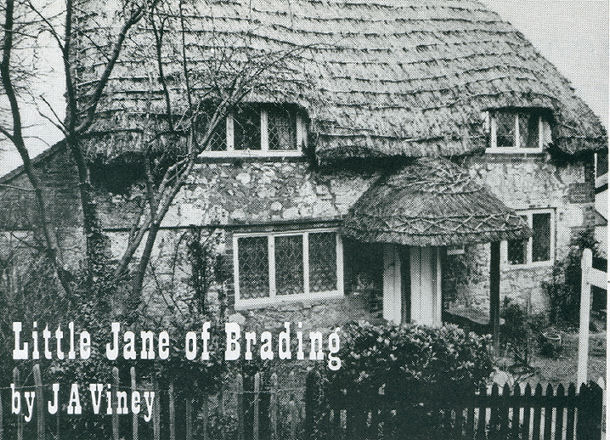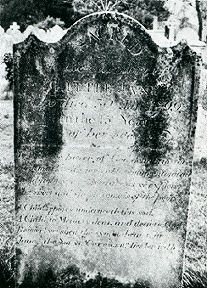
IN
ATTEMPTING to
write anything about Jane Squibb, or Little Jane as she is more usually
known, it is first necessary to mention the man without whom her story
would not have been possible in the first place. and would certainly never
have been set down.
That
man was Legh Richmond, who in the summer of 1797 came to the little parish
of Brading and Yaverland as its deacon. He was then a young man in his
early twenties, and full of new ideas which he hoped to bring into use for
the benefit of the people of the parish. A year later, after he had become
established he was made the priest in charge. It was shortly afterwards
that it occurred to him that some of the younger members of his flock were
not as fully conversant with the teachings of the Church as he would like,
so he at once set about arranging a small school for them, which was
conveniently held on Saturday afternoons, in the garden of his house,
next to the Church. It was as a member of these weekly meetings that Jane
first came to his attention. She was then twelve years old and at first he
took little notice of the child who did not appear to be any different
from the others, although she listened readily enough to the stories he
told them.
Legh
Richmond was an ardent naturalist. He saw in the natural world around
him the best possible opportunity of bringing out the points he wished to
make. It was during one of these Saturday teachings that Jane first made
her special interest in the work he was doing known to him. He had set the
children to go into different parts of the churchyard ind each to learn by
heart one of the epitaphs, which were then usually quite a long verse,
expressing sentiments which it was thought desirable for children to
learn. Little Jane returned in due course with the others, but to
Richmond’s surprise, she had memorised two verses on adjacent stones,
instead of the one that was required. Her reason for doing so astounded
and delighted him. She told him that she had thought the second verse
particularly meaningful, and had learnt it by heart for the good of her
soul. Her unexpected understanding of the work he was trying to do led
Richmond to take an increasing interest in the child during the next few
weeks.
Then, quite suddenly, for several of the Saturday meetings, she was absent from the little group in the garden. Upon enquiring after her, Richmond learnt from a neighbour that Jane had taken to her bed, that she was suffering from tuberculosis and was not expected to live long. The neighbour also passed on to him Jane’s urgent request that he should, if he could spare the time, come to visit her. This he did a few days later, to find her alone in the house, in bed in her damp and crumbling room upstairs. Large pieces of the wall had broken away and what remained of the window was covered with paper. Richmond knew of the poor financial situation of Jane’s family and was not surprised to find such disorder but the change he saw in Jane herself startled him. Her normally healthy appearance was gone, its place taken by a grey pallid face and a sharp dry cough which shook her violently from time to time. Jane however was glad to see him, and at once began to pour out to him her thoughts and feelings about Christianity and the things he had taught her. As on the previous occasion he was amazed at her understanding and the clarity of her thoughts on the subject of religion.
This
was to be just the first of many visits that Legh Richmond was to make to
Jane. At first her parents strongly disapproved of their daughter’s new
interest. They themselves had no time for Jane’s deep concern for the
state of her soul which they presumed to be based on her knowledge that
her own death could not be far off. She continued however to rise in
Richmond’s estimation. With every visit she seemed more pious, more genuinely
affected by the religious convictions she now held so deeply, and, under
his guidance, she tried to prepare herself for what was to come. But she
was deeply troubled by her family’s complete disregard for the things
she had come to find so important, and her most urgent desire was for them
to be converted to the philosophy she now followed.
|
It
was in the early dawn of a late summer morning that Richmond
received a message to call on Jane for the last time. It was not
unexpected and he lost no time in taking his usual way to her
cottage, trying as he did so to compose his thoughts. As he climbed
the stairs he found the family altogether for the first time. In
between bouts of unconsciousness, Jane was talking to them, and
far from showing their previous indifference, they seemed deeply
affected by what she said. Just before she died they accepted her
faith. As the sun came up, Jane spoke to them each in turn, thanking
them, and saying goodbye. As he left and began the walk home, Richmond felt that an important episode in his life had in a way reached a satisfactory conclusion. Jane’s life had been a short one; but she had been a real influence for good in the small community in which she had lived. He determined that her story should not be forgotten, and included it in his ‘Annals of the Poor’ published some years later, and again recently. Little Jane’s cottage can still be seen at Brading and her tombstone stands in the churchyard that was once her first inspiration. |
|
From Wight Life April/May 1972
23 September 2007
